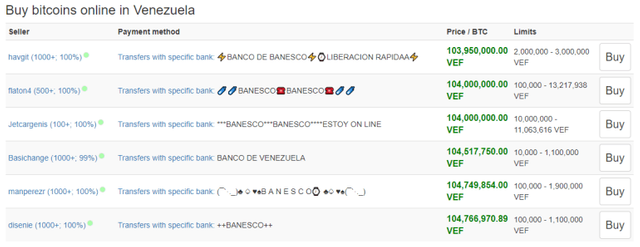Global Economic Turmoil Drives Flight to Cryptocurrency
 Imagine you live in a country whose currency loses value every single day, and inflation has risen to the point where products might cost twice what you paid just weeks ago. You work two full-time jobs to make ends meet, and it’s still not even enough. The government has exercised capital control to limit the flow of foreign capital in and out of the domestic economy, thus making it impossible to escape the clutches of hyperinflation.
Imagine you live in a country whose currency loses value every single day, and inflation has risen to the point where products might cost twice what you paid just weeks ago. You work two full-time jobs to make ends meet, and it’s still not even enough. The government has exercised capital control to limit the flow of foreign capital in and out of the domestic economy, thus making it impossible to escape the clutches of hyperinflation.
Then, out of nowhere come digital currencies which the government can’t control, tax or stop from entering/exiting its territory. Suddenly, you have the option to preserve your savings and earnings with an asset that appreciates instead of being swallowed by inflation.
The Venezuelastrophe
It is happening in countries like Venezuela right now. People are ditching the Venezuelan Bolívar at every possible chance because of its instability. Inflation hit a previous all time high in December 2016 at 800% rendering the Bolivar nearly worthless. At this time, one US Dollar could fetch as much as 1,000 bolivars on the black market even though the globally established exchange rate was 10 for one. Desperation was that real. An average monthly government salary in Venezuela is about 27,500 bolivars, or a measly $27.50 at black market rates. That is enough to buy a loaf of bread, a dozen eggs, a pound of powdered milk, and a few kilos of assorted staple goods (rice, sugar, cooking oil). Although prices at established grocers have risen exponentially, often they are sold out. Citizens must then turn to street vendors where markup can be as much as 50%.
To put this fully in perspective, let’s compare the Bolivar to bitcoin and the US Dollar. Bitcoin is trending on localbitcoins.com at roughly 104,000,000 VEF each. In other words, Venezuelan citizens are willing to offer 104 million units of their native currency in exchange for one share of the digital currency. At the current bitcoin price (~$4200) this makes one Bolivar equal to $0.00004 (not even close to a penny). Ironically, one satoshi, the smallest divisible unit of bitcoin, is valued the same at today’s rate.
Something has to change…and it is.
Cryptocurrency to the Rescue
Venezuelan’s discovered Bitcoin as a means of survival. Mining has proven to be profitable — much better than working a typical job. Miners can earn up to $500 (500,000 black market bolivar) per month, easily enough to afford necessities and then some. Mining rigs are not cheap to run, however, and in fact they use incredible amounts of electricity. Anywhere else this would this would pose a problem for broke citizens, but in Venezuela socialized electricity is subsidized to the point that it is virtually free. The country enjoys a competitive advantage because of this, and miners are able to thrive…at least until authorities find and raid their operation. You see, the problem with accepting subsidized electricity (or subsidized anything for that matter) is that you must also accept the government’s definition of what your ‘fair’ allotment is. Fighting for survival is not reason enough to use more than an average amount of energy, according to officials who prosecute miners on charges of computer crimes, money laundering, terrorism, and anything else they can come up with to supplement their lack of legislation governing cryptocurrency. Miners retaliate by “decentralizing” their operations, or spreading the machines over various locations to avoid being discovered by the state power corporation.
This problem does not stop with Venezuela. Ukraine (2015) and Brazil (2016) have been hit hard by inflation in past years and Egypt more recently. In each case, capital controls kicked in, and cryptocurrencies such as Bitcoin and ZCash became citizens’ only method of divesting from a collapsing native currency. Egyptian entrepreneurs have recently sought to open Egypt’s first Bitcoin marketplace to make these options easier to exercise for the general public, but the central bank has so far prevented it from happening. Ukraine’s economic situation led to BTMs (Bitcoin Teller Machines) beginning to pop up across the country, providing quick access for its citizens. Its goal is to build 150 BTMs by year end.
In contrast, crypto markets have performed exceedingly well. Year-to-date, Bitcoin has risen well over 300% vs the US Dollar, while Ethereum has risen over 3700%, even after a market correction. Altcoins have seen similar gains. It doesn’t take a genius to understand why so many are shifting assets out of fiat and into digital currencies. The argument that ‘digital assets aren’t backed by anything, and fiat is’ no longer holds any weight. As economies topple one after another and central banks are left with their pants down, it becomes evident that fiat is the joke of the two. Many other world economies dangle by a string, central banks being the invisible hand that both suspends them there and lynched them up in the first place. Failed global policies will eventually bring them down, and if the flight to digital currencies trend continues, Bitcoin and the like should see new highs.
source - www.cryptoanswers.net
Congratulations @danman1234! You have completed some achievement on Steemit and have been rewarded with new badge(s) :
Click on any badge to view your own Board of Honor on SteemitBoard.
For more information about SteemitBoard, click here
If you no longer want to receive notifications, reply to this comment with the word
STOP